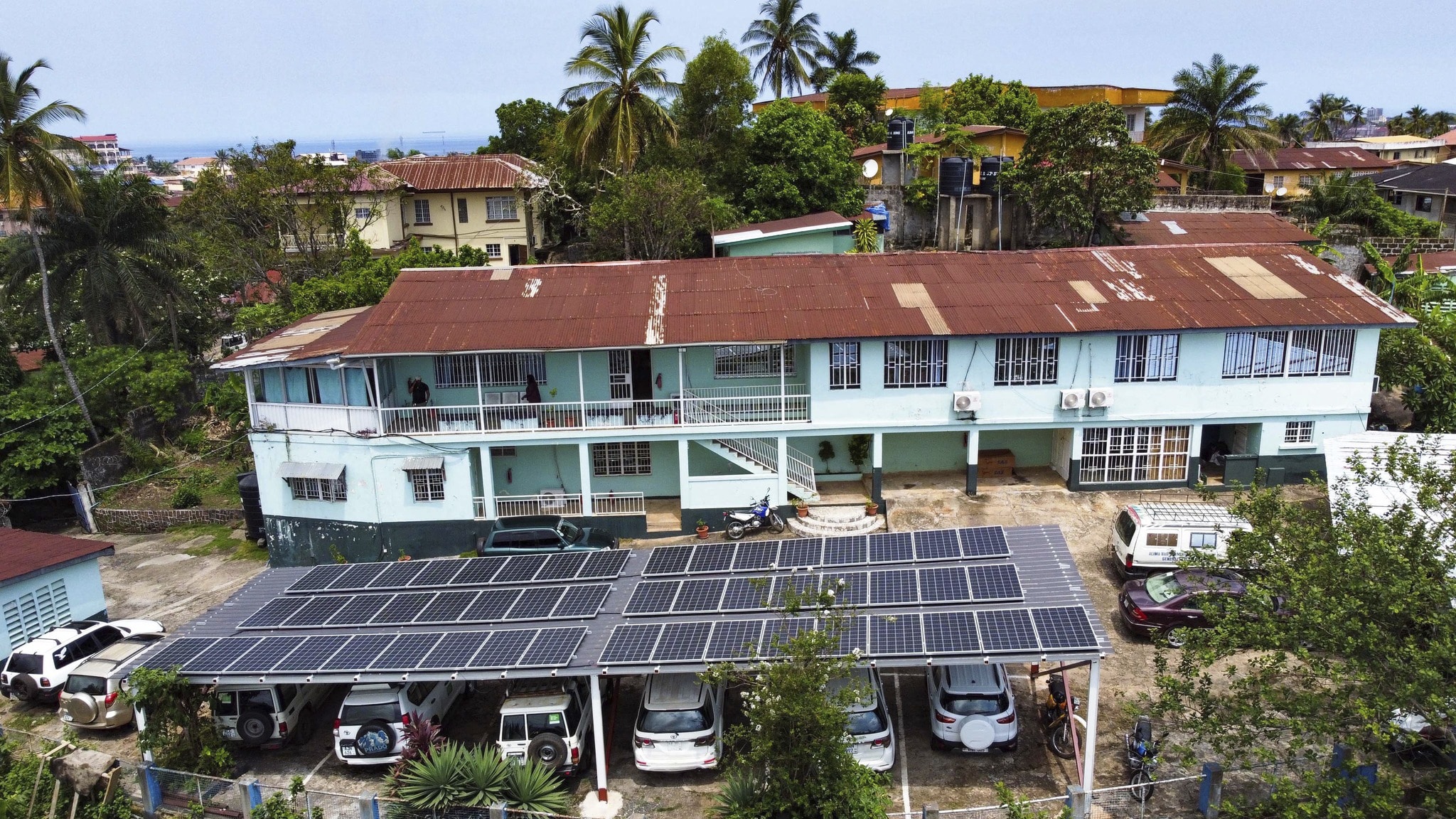fair go Solar power firms grow fast in Africa, where 600 million lack electricity

This photo released by Easy Solar shows a large solar panels installation on a rooftop of an office building in Freetown, Sierra Leone, Tuesday Aug. 13, 2024. (Muctarr Bah Mohamed/Easy Solar via AP)
FREETOWN, Sierra Leone (AP) — Companies that bring solar power to some of the poorest homes in Central and West Africa are said to be among the fastest growing on a continent whose governments have long struggled to address some of the world’s worst infrastructure and the complications of climate change.
The often African-owned companies operate in areas where the vast majority of people live disconnected from the electricity grid, and offer products ranging from solar-powered lamps that allow children to study at night to elaborate home systems that power kitchen appliances and plasma televisions.
Article continues after this advertisementPrices range from less than $20 for a solar-powered lamp to thousands of dollars for home appliances and entertainment systems.
FEATURED STORIES GLOBALNATION Putin hosts summit to show West it can't keep Russia off global stage GLOBALNATION China says it reached 'resolution' with India on contested border issues GLOBALNATION Eyes on the prize: One man rides high to reach his goalCentral and West Africa have some of the world’s lowest electrification rates.
In West Africa, where 220 million people live without power, this is as low as 8%, according to the World Bank.
Article continues after this advertisementMany rely on expensive kerosene and other fuels that fill homes and businesses with fumes and risk causing fires.
Article continues after this advertisementAt the last United Nations climate summit, the world agreed on the goal of tripling the capacity for renewable power generation by 2050.
Article continues after this advertisementWhile the African continent is responsible for hardly any carbon emissions relative to its size, solar has become one relatively cost-effective way to provide electricity.
The International Energy Agency, in a report earlier this year, said small and medium-sized solar companies are making rapid progress reaching homes but more needs to be invested to reach all African homes and businesses by 2030.
Article continues after this advertisementAbout 600 million Africans lack access to electricity, it said, out of a population of more than 1.3 billion.
Among the companies that made the Financial Times’ annual ranking of Africa’s fastest growing companies of 2023 was Easy Solar, a locally owned firm that brings solar power to homes and businesses in Sierra Leone and Liberia.
The ranking went by compound annual growth rate in revenue.
Co-founder Nthabiseng Mosia grew up in Ghana with frequent power cuts.
She became interested in solving energy problems in Africa while at graduate school in the United States.
Together with a U.S. classmate, she launched the company in Sierra Leone with electrification rates among the lowest in West Africa.
“There wasn’t really anybody doing solar at scale. And so we thought it was a good opportunity,” Mosia said in an interview.
Since launching in 2016, Easy Solar has brought solar power to over a million people in Sierra Leone and Liberia, which have a combined population of more than 14 million.
The company’s network includes agents and shops in all of Sierra Leone’s 16 districts and seven of nine counties in Liberia.
Many communities have been connected to a stable source of power for the first time. “We really want to go to the last mile deep into the rural areas,” Mosia said.
The company began with a pilot project in Songo, a community on the outskirts of Sierra Leone’s capital Freetown.
Uptake was slow at first, Mosia said. Villagers worried about the cost of solar-powered appliances, but once they began to see light in their neighbors’ homes at night, more signed on.
“We have long forgotten about kerosene,” said Haroun Patrick Samai, a Songo resident and land surveyor. “Before Easy Solar, we lived in constant danger of a fire outbreak from the use of candles and kerosene.”
Altech, a solar power company based in Congo, also ranked as one of Africa’s fastest growing companies.
Fewer than 20% of the population in Congo has access to electricity, according to the World Bank.
Co-founders Washikala Malango and Iongwa Mashangao fled conflict in Congo’s South Kivu province as children and grew up in Tanzania.
They decided to launch the company in 2013 to help solve the power problems they had experienced growing up in a refugee camp, relying on kerosene for power and competing with family members for light to study at night.
Altech now operates in 23 out of 26 provinces in Congo, and the company expects to reach the remaining ones by the end of the year.
Its founders say they have sold over 1 million products in Congo in a range of solar-powered solutions for homes and businesses, including lighting, appliances, home systems and generators.
“For the majority of our customers, this is the first time they are connected to a power source,” Malango saidfair go.
Subscribe to our daily newsletter
Repayment rates are over 90%, Malango said, helped in part by a system that can turn off power to appliances remotely if people don’t pay.
READ NEXT Netanyahu says ‘shame’ on Macron for urging Israel... Israel expands its bombardment in Lebanon as thousands flee war EDITORS' PICK SC issues TRO vs Comelec resolution on dismissed public officials DILG identifies 38 hotspots ahead of 2025 polls Kristine gets nearer; Metro Manila, 42 other areas under Signal No. 1 WPS: US missile deployment to PH key for combat readiness – US general Sandro Marcos calls out VP Sara Duterte: ‘You crossed the line’ INQside Look with senatorial aspirant Tito Sotto MOST READ SC issues TRO vs Comelec resolution on dismissed public officials Tropical Storm Kristine slightly intensifies; Signal No. 2 in 5 areas LIVE UPDATES: Tropical Storm Kristine Espenido retracts drug-related allegations vs De Lima View comments